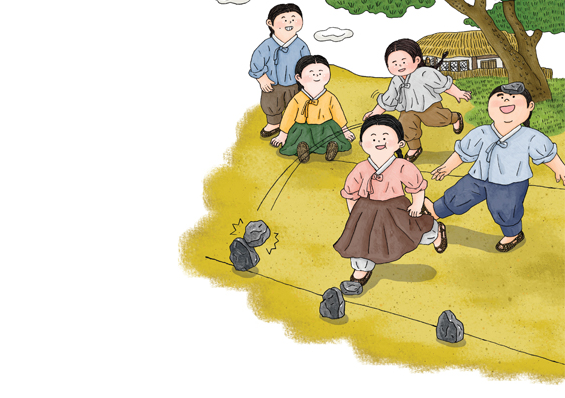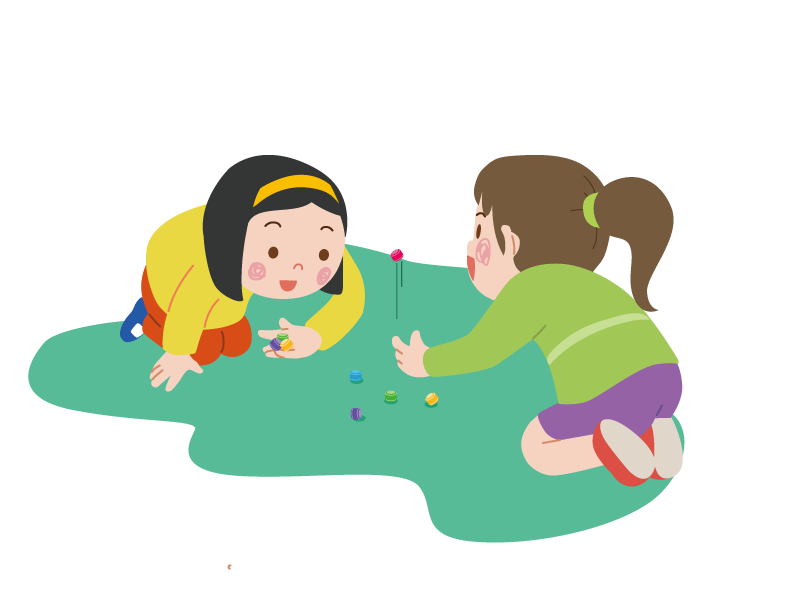Watching Squid Game Season 2 was an unforgettable experience, not just because of its gripping storyline but because it introduced me to several traditional Korean games that I had never encountered before. The series creatively weaves these games into its dark survival narrative, blending childhood nostalgia with high-stakes tension. As I watched, my curiosity about these games grew, prompting me to delve deeper into their origins and cultural significance.Among the games introduced, ddakji, biseokchigi, gong-gi, jegi, spinning top, and Mingle all hold cultural significance, reflecting values of community, cooperation, and resilience This exploration not only enhanced my appreciation of the series but also inspired me to try one of these games—Jegi—myself. In this essay, I will share my journey of discovery, introduce the games, and reflect on my own experience attempting to play Jegi.
Ddakji
Ddakji is a traditional Korean game where players fold paper into a square and attempt to flip their opponent's paper by throwing their own at it. This game is not only a test of precision and skill but also a reflection of Korean childhood memories, where young people would often play it in schoolyards or on the streets. Its simplicity and the strategic thinking required make it a timeless part of Korean culture. In Squid Game, ddakji takes on a darker role, where it sets the tone for the high-stakes challenges to come, juxtaposing the innocent nature of the game with the deadly consequences in the show.
Biseokchigi
Biseokchigi is another traditional Korean game that involves throwing smaller stones at a larger one, with the goal of knocking it over. It was commonly played in rural areas, fostering a sense of community as children gathered to play. The game requires precision and control, mirroring the strategic nature of the games in Squid Game. In the series, this game not only represents physical skill but also symbolizes overcoming obstacles, much like the contestants' struggles to survive against overwhelming odds.

Gong-Gi
Gong-gi, or Korean jacks, is a game that involves bouncing small stones and catching them in a specific sequence. It has been a part of Korean childhood for centuries and requires dexterity and concentration. The game, typically played by girls, also emphasizes patience and focus. In Squid Game, gong-gi's appearance highlights the theme of balance—both physical and mental. As players engage with the game, they must maintain control over their actions, much like the contestants who must navigate the psychological and emotional challenges of the games.

As the contestants in Squid Game navigated challenges like ddakji, gong-gi, and biseokchigi, I found myself pausing to learn more about these traditional games. Each game seemed simple at first glance but carried deep cultural roots and values. For instance, ddakji, with its folded paper tiles, brought back memories of childhood playfulness while symbolizing strategy and precision. Gong-gi, or Korean jacks, reflected dexterity and balance, and biseokchigi demonstrated the joy of shared outdoor activities. This research turned my viewing experience into a cultural journey, connecting me with the traditions and values these games represent.
Jegi
Jegi is a traditional Korean game where players kick a small object into the air and keep it from touching the ground. It requires balance, coordination, and timing, making it a fun yet challenging game that is often enjoyed during festivals. Personally, I have played Jegi, and I found it to be quite difficult at first. The challenge of keeping the object in the air and mastering the right movements was tough for a beginner like me. However, the game was incredibly enjoyable, and the sense of achievement when I finally got the hang of it made the experience all the more rewarding. Jegi, in Squid Game, represents the themes of perseverance and control. Despite the difficulty, players must keep their composure, much like the contestants who must stay focused to survive.
Spinning Top
The spinning top, or paengi, is a classic Korean game where players spin a small top using a string or a stick. Traditionally, this game is popular during the winter months and has long been associated with Korean folk traditions. In Squid Game, spinning top games reflect the characters’ struggles to maintain control in a chaotic environment. The top, much like the contestants, must remain steady and in motion, symbolizing the balance between control and chaos.

Mingle
The Mingle game is a more contemporary game featured in Squid Game Season 2, involving participants who move in a circle while singing a song. The game requires players to follow the rhythm and timing of the song, coordinating their movements with others in the group. Traditionally, Mingle is a game enjoyed during festivals or celebrations, emphasizing community, harmony, and teamwork. The use of song in the game also connects to Korea’s rich musical traditions, where music often accompanies physical movement in traditional practices.
My Attempt at Playing Jegi
Among all the games featured, Jegi stood out to me as particularly intriguing. This traditional game, often enjoyed during festivals, involves kicking a small object—resembling a shuttlecock—into the air and keeping it from touching the ground. Inspired by what I learned, I decided to try playing Jegi. At first, it was incredibly challenging; the timing, balance, and coordination required were far from easy for a beginner like me. However, with practice, I started to improve, and the sense of accomplishment was immensely rewarding. The game taught me perseverance and the importance of focus—qualities that also resonated with the themes of Squid Game.
The Games and Their Cultural Significance
Each game showcased in Squid Game carries cultural weight. Gong-gi, for instance, emphasizes patience and control, while the spinning top, or paengi, symbolizes balance amidst chaos. The Mingle game, with its rhythmic movement and community-oriented nature, reflects harmony and cooperation. By incorporating these games, Squid Game not only highlights their cultural importance but also juxtaposes their innocence with the intense stakes of the competition.
Bridging Cultures Through Play
Through its use of traditional Korean games, Squid Game offers global audiences a unique window into Korean culture. These games, though simple in design, embody values like community, resilience, and balance, making them timeless. Personally, my journey of discovering these games—and attempting Jegi—deepened my connection to Korean traditions. Despite its initial difficulty, Jegi brought me immense joy and a new appreciation for the art of traditional play.
Conclusion
Squid Game Season 2 serves as a cultural bridge, introducing the world to Korea's rich heritage through its traditional games. My experience watching the series, researching these games, and attempting Jegi was both enlightening and enjoyable. These games remind us that cultural traditions, even in their simplest forms, have the power to connect people across the globe. For me, Jegi was not just a game; it was a lesson in perseverance, balance, and the beauty of traditional play. As I continue exploring Korean culture, I am grateful for how Squid Game inspired this journey.
How about this article?
- Like8
- Support0
- Amazing0
- Sad1
- Curious0
- Insightful0


